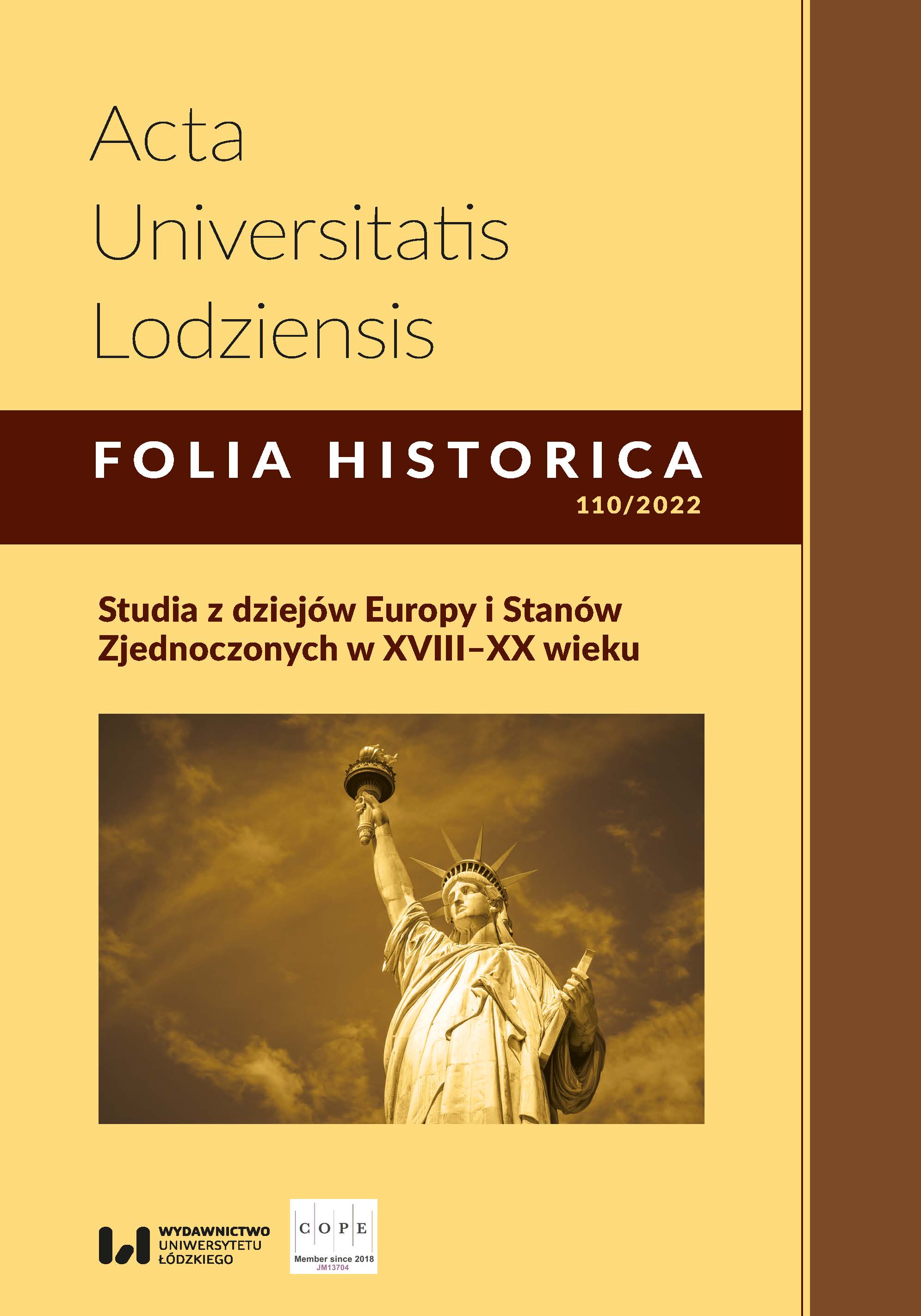Słów kilka o pamięci Brytyjczyków o Great War po II wojnie światowej do czasów współczesnych
DOI:
https://doi.org/10.18778/0208-6050.110.20Słowa kluczowe:
I wojna światowa / Wielka Wojna, Wielka Brytania, pomniki, Cenotaph, pamięć, Dzień Rozejmu, upamiętnianieAbstrakt
Ogromne straty i traumatyczne doświadczenia związane z Great War pozostawiły trwały ślad w życiu milionów Brytyjczyków i ich rodzin. Budowa pomników, cmentarzy wojennych i rytuały rocznicowe upamiętniające poległych w dużej mierze kształtowały pamięć o I wojnie światowej, szczególnie żywą po zakończeniu wojny i w latach międzywojennych. Artykuł niniejszy jest próbą spojrzenia na pamięć Brytyjczyków o Great War po doświadczeniach II wojny światowej i współcześnie, z okazji setnej rocznicy I wojny światowej. Postrzeganie Great War oraz kreowanie pamięci zbiorowej o niej ulegały znacznym przemianom w kolejnych dekadach po 1945 r. Szczególnie aktywną rolę w podtrzymywaniu pamięci o I wojnie światowej odegrali weterani i ich rodziny. Oral history, programy telewizyjne, wywiady z udziałem ostatnich weteranów, uczestników i świadków wojny wpłynęły na zwiększone zainteresowanie Great War w latach osiemdziesiątych XX w. i kolejnych dekadach. Uroczystości setnej rocznicy I wojny światowej, obchodzone w latach 2014–2018, liczne inicjatywy i sposoby upamiętniania wydarzeń sprzed wieku, odegrały ważną rolę w upowszechnieniu popularnego obrazu I wojny światowej wśród dzisiejszych Brytyjczyków, a także podtrzymywaniu pamięci o niej kolejnych pokoleń.
Pobrania
Bibliografia
Anderson B., Imagined Communities: Reflections on the Origins and Spread of Nationalism, London 1983.
Google Scholar
Anderson B., Wspólnoty wyobrażone. Rozważania o źródłach i rozprzestrzenianiu się nacjonalizmu, przekł. S. Amsterdamski, Kraków 1997.
Google Scholar
Black J., ‘Thanks for the memory’. War memorials, spectatorship and the trajectories of commemoration, 1919–2001, [w:] Matters of Conflict: Material Culture, Memory and the First World War, ed. N.J. Saunders, London 2004, s. 134–148.
Google Scholar
Bongiorno F., Anzac and the Politics of Inclusion, [w:] War Memory and Popular Culture: Essays on Modes of Remembrance and Commemoration, eds M. Keren, H. Herwig, Jefferson 2009, s. 81–97.
Google Scholar
Britain’s Last Tommies. Final Memories from Soldiers of the 1914–18 War in Their Own Words, ed. R. van Emden, Barnsley 2005 (wyd. 2: 2017).
Google Scholar
Danilova N., The Politics of War Commemoration in the UK and Russia, Houndmills–Basingstoke 2015. https://doi.org/10.1057/9781137395719
Google Scholar
DOI: https://doi.org/10.1057/9781137395719
Edwards P.J., A War Remembered: Commemoration, Battlefield Tourism and British Collective Memory of the Great War, Brighton 2004.
Google Scholar
Evans W., Vandervelden P., Corremens L., Visitor’s Guide. Silent Cities in Flanders Fields. Ypres Salient and West Flanders Word War I Cemeteries, Houten 2013.
Google Scholar
Gregory A., The Silence of Memory: Armistice Day 1919–1946, Oxford 1994.
Google Scholar
Harrison T., Remembrance Today: Poppies, Grief and Heroism, London 2012.
Google Scholar
Heathorn S., Haig and Kitchener in Twentieth-Century Britain. Remembrance, Representation and Appropriation, Farnham 2013.
Google Scholar
Hobsbawm E., Nations and Nationalism Since 1780: Programme, Myth, Reality, Cambridge–New York 1992. https://doi.org/10.1017/CCOL0521439612
Google Scholar
DOI: https://doi.org/10.1017/CCOL0521439612
King A., Memorials of the Great War in Britain: The Symbolism and Politics of Remembrance, Oxford 1998.
Google Scholar
Lloyd D.W., Battlefield Tourism. Pilgrimage and the Commemoration of the Great War in Britain, Australia, and Canada, 1919–1939, Oxford–New York 1998.
Google Scholar
Login E., Set in Stone? War Memorialisation as a Long-Term and Continuing Process in the UK, France and the USA, Oxford 2015. https://doi.org/10.2307/j.ctvxw3p0m
Google Scholar
DOI: https://doi.org/10.2307/j.ctvxw3p0m
Luckins T., The Gates of Memory: Australian People’s Experiences and Memories of Loss and the Great War, Freemantle 2004.
Google Scholar
Medlock Ch.A., “They Did Their Bit” – British Animal Welfare Societies and the Memorialization of War Animals since Anglo-Boer War, [w:] War and Memorials. The Age of Nationalism and the Great War, eds F. Jacob, K. Pearl, Paderborn 2019, s. 139–156.
Google Scholar
Miles S., The Western Front. Landscape, Tourism and Heritage, Barnsley 2016.
Google Scholar
Mosse G.L., Masses and Man: Nationalist and Fascist Perceptions of Reality, Detroit 1987.
Google Scholar
Mycock A., The Politics of the Great War Centenary in the United Kingdom, [w:] Nation, Memory and Great War Commemoration: Mobilizing the Past in Europe, Australia and New Zealand, eds S. Sumartojo, B. Wellings, Oxford–Bern 2014, s. 99–118.
Google Scholar
Myers J.R., The Great War and Memory in Irish Culture, 1918–2010, Bethesda–Dublin–Palo Alto 2013.
Google Scholar
Parafianowicz H., Great War and Good War w historii i pamięci Amerykanów, Białystok 2020.
Google Scholar
Parafianowicz H., Pierwsza wojna światowa w pamięci Brytyjczyków w okresie międzywojennym, „Białostockie Teki Historyczne” 2017, t. XV, s. 159–177. https://doi.org/10.15290/bth.2017.15.08
Google Scholar
DOI: https://doi.org/10.15290/bth.2017.15.08
Saunders N.J., Material Culture and Conflict. The Great War, 1914–2003, [w:] Matters of Conflict: Material Culture, Memory and the First World War, ed. N.J. Saunders, London 2004, s. 5–34.
Google Scholar
Thomson A., The Great War and Australian Memory: A Study of Myth, Remembering and Oral History, Brighton 1990.
Google Scholar
Todman D., The Great War: Myth and Memory, London 2005.
Google Scholar
Wilson R.J., Cultural Heritage of the Great War in Britain, London–New York 2013.
Google Scholar
Winter J., Remembering War: The Great War between Memory and History in the Twentieth Century, New York–New Haven–London 2006.
Google Scholar
Winter J., Sites of Memory, Sites of Mourning. The Great War in European Cultural History, Cambridge 2014. https://doi.org/10.1017/CBO9781107589087
Google Scholar
DOI: https://doi.org/10.1017/CBO9781107589087
Winter J., War Beyond Words. Languages of Remembrance from the Great War to the Present, Cambridge 2017. https://doi.org/10.1017/9781139033978
Google Scholar
DOI: https://doi.org/10.1017/9781139033978
Ziino B., A Distant Grief: Australians, War Graves and the Great War, Crawley 2007.
Google Scholar
Lest we forget: Poppies and public commemoration, https://www.hrp.org.uk/about-us/research/lest-we-forget-poppies-and-public-commemoration/#gs.awbq6t (dostęp: 8 IX 2021).
Google Scholar
Liddle Collection, https://library.leeds.ac.uk/special-collections/collection/723 (dostęp: 8 IX 2021).
Google Scholar
Remembrance Sunday, https://www.britannica.com/topic/Remembrance-Sunday (dostęp: 8 IX 2021).
Google Scholar
War memorial to African-Caribbean soldiers unveiled in London, https://www.bbc.com/news/uk-england-london-40372063 (dostęp: 8 IX 2021).
Google Scholar
War Memorials Register, https://www.iwm.org.uk/memorials (dostęp: 8 IX 2021).
Google Scholar
Pobrania
Opublikowane
Jak cytować
Numer
Dział
Licencja

Utwór dostępny jest na licencji Creative Commons Uznanie autorstwa – Użycie niekomercyjne – Bez utworów zależnych 4.0 Międzynarodowe.











